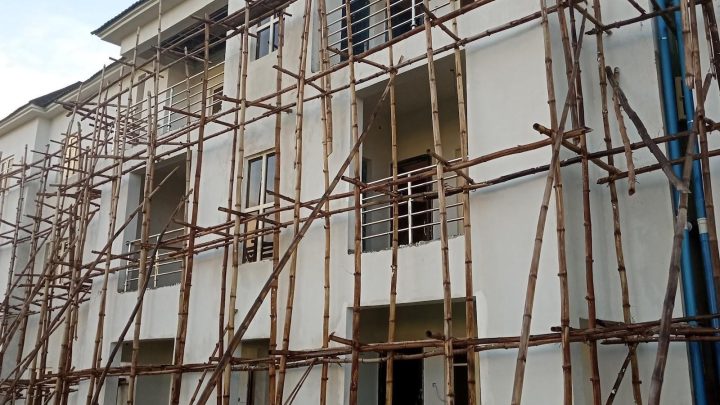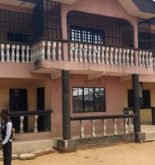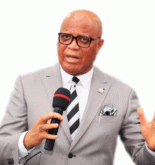By Sylvia Akpan
In a clear violation of its procurement law, former Governor Ben Ayade overpaid a contractor not only for uncompleted university projects but also for a contract that was cancelled, Sylvia Akpan reports.
How Ayade blurred the lines
Awokaris Greenworld Industrial Limited, a registered environmental services company is on the spotlight after securing education contracts worth N110m in an unexpected twist that blurs the line between landscaping, gardening, and education.
Under the Ben Ayade administration, the company curiously got education sector contracts including winning bids to print and deliver state examination materials for N90 million and offer consultancy for the formalisation of British Canadian University, Obudu for N20 million. This unexpected leap from tending greenery to handling crucial educational projects raises eyebrows and questions. How did a purely environmental company get into shaping minds and curricula?
Awokaris Greenworld Limited was registered with the Corporate Affairs Commission (CAC) on June 11, 2013. Its board of directors include Christian Himabe Awowoh, Ekaete Kate Udo Awowoh, and Christian Himabe Awowoh (jnr) and its headquarters is located at No. 9, Oyenmakeihi Abyosubi Airport Road, Warri, Delta State.
Despite efforts by our reporter to get the Awowohs to answer questions on why they received money for jobs they lacked competence, they have failed to respond to mails, SMS and phone calls. Instead of responding to inquiries by our reporter, Christian Awowoh, the company’s chief executive rather blocked her after reading messages sent to him.
When an inquiry was sent to his messaging app, WhatsApp, it was discovered that the account had his profile photo, but as soon as the message was delivered and marked read, his picture vanished, leaving only his wife’s. Our investigation further showed that he is not only the CEO of Awokaris Greenworld Industrial Limited, but also the South-south representative of the Nigeria Extractive Industry Transparency Initiative (NEITI).
NEITI is Nigeria’s chapter of the global Extractive Industries Transparency Initiative (EITI) mandated by law (The NEITI Act 2007) to promote transparency and accountability in the management of Nigeria’s oil, gas and mining revenues. His LinkedIn profile, also shows that Christian Awowoh is a Piling Engineer at Hallibrown Intanation with 58 followers and 57 connections.
The reporter found out through his official Facebook handle that Christian Awowoh is also a politician. In fact, he had contested for the Obanliku State Constituency seat at the Cross River State House of Assembly under the Peoples Democratic Party, PDP and lost in 2019. His Awokaris Greenworld Industrial Limited also has Ekaete Kate Udo Awowoh, his wife, and Christian Himabe Awowoh (jnr), his son, as the directors.
How Ayade and a transparency watchdog violated procurement law
While Awokaris Greenworld Industrial Limited is registered to do business in Nigeria, awarding it a N110 million education sector contract is in direct violation of Part 3, Section 6(a) of the Cross River State Procurement Law, 2020 Law No. 9. The law stipulates that all bidders must have qualified personnel with pertinent experience to fulfill the obligations of the procurement contract.
State data from the Due Process and Price Intelligence Bureau shed more light on a confusing situation. Despite prematurely ending the contract for the supply of examination materials – without offering any explanation – the company nevertheless got a staggering N250m from the government. This payment (made in two installments – N90m on November 23, 2020, and an additional N160m on June 18, 2021) exceeded the approved contract sum by N140m. The government has no explanation for the over-payment.
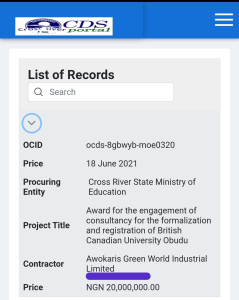
Receipt of first tranche payment
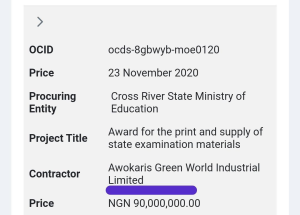
Receipt of the second tranche payment for the contract
Payment for jobs not done
Despite the fact that the contractor was overpaid, a thorough analysis of former Governor Ayade’s end-of-term report exposes an unsettling reality: the government was not truthful about the British Canadian University project.
You can also read – CSOs hail Cross River Assemblyman for championing tax equity
The status of the British Canadian University has raised serious concerns. Firstly, the state government claimed that it is a private university and that is confirmed by the fact that the state assembly has not passed a law to legalize it. Secondly, the Ayade administration spent state resources to award contract to register the institution which is deemed a private property. A visit to the university showed that work had long stopped and the buildings were filled with bamboo sticks while wild grasses were competing for space.
One university different owners
An online search on the website on the National Universities Commission (NUC), indicates that the university was listed as one of the new private universities, with the proprietor listed as Kingshill Education Limited under the mentoring of the University of Calabar, Cross River State.
A simple search on the Corporate Affairs Commission (CAC) portal indicates that the university is not owned by Kingshill Education Limited as captured on the NUC website. The CAC portal shows that the university is owned by Ikang Gabriel Francis of No. 8, Itu Okon Street, Ikot Ansa, and Ekpenyong Aniedi Bassey of No. 4, Ene Okon Crescent, all in Calabar, Cross River State.
While Francis was permanent secretary, at the ministry of finance, Bassey was permanent secretary in the education ministry, both under the immediate past administration of Udom Emmanuel in Akwa Ibom State.
However, a Memorandum of Association (MoU) obtained from CAC on the university shows that it is wholly owned by the Cross River State Government. The document indicates that the university has one million shares, with two shareholders, – Cross River State Government – owning 500,000 shares each.
Two separate addresses were provided for the government – No 4 Ene Okon Crescent, Ene Calabar, Calabar and No. 8, Itu Okon Street, Ikot Ansa, Calabar. Curiously, the addresses belonged to Francis and Bassey, the purported owners of the university.
The confusion over the university’s ownership gets deeper with the NUC’s listing of Heirbase Management Solutions Limited and the Cross River State Ministry of Finance as the owners. Thus, separate people are identified as the university owners in three independent documents, including the NUC website, the CAC portal, and the MoU with the CA, with the Cross River state government linked to them.
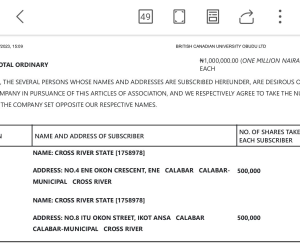
Addresses found on British Canadian University document
Owners are nowhere to be found
Our reporter had visited the No. 4, Ene Okon Crescent’s home of Ekpenyong, the former permanent secretary of the ministry of education in Calabar on November 1, 2023. After being partially allowed into the compound by the gatemen, she came face-to-face with her, the following conversation ensued.
“Please, I’m looking for Mrs. Aniedi Bassey Ekpenyong,” the reporter asked. “Who is looking for her,” the former permanent secretary responded.
When the reporter introduced herself, the woman further inquired, “What’s the issue?” As soon as the reporter raised questions about the British Canadian University, she responded, “I have retired so I’m no longer there. I retired two months ago or thereabout. What do you people have to watch this time around? Well, I don’t know anything about it. Anyway, maybe you will see the commissioner there now. I think he’ll be in a better position to enlighten you on that.”
Meanwhile, our reporter had earlier met Ekpenyong in her office on September 8, 2023, shortly before her retirement and she referred her to the State Universal Basic Education Board (SUBEB).
The reporter also visited No. 8, Itu Okon Street, Ikot Ansa, Calabar, one of the addresses listed on the CAC portal and asked about the British Canadian University, Obudu.
A lady in the compound referred the reporter to someone she called “AK,” adding that although he was not around, the man was in the best position to know about the university.
Armed with the verified phone number of AK, the reporter later called and met with him on November, 2, 2023 at the former Chinese Restaurant at the State Housing Estate in Calabar.
After threatening not to speak until our reporter disclosed how she got his name and contact, the man, which Truecaller revealed as Akomaye Agbabia finally spoke up denying knowledge of the university. When he was shown evidence of his involvement with the institution, he claimed he had no hand in its registration.
With a little more persuasion in Efik Language, Agbabia opened up that former Governor Ayade had no real intention of completing the project.
“It is a white elephant project. To make it easy for you, Ayade is from my place, maybe my brother or whatever but every project of his has been like a smokescreen. It was like a cunning way for theft.
“So, for your British Canadian University from the little I know, I don’t think it was gazetted by the government. But the only thing that is functional there is the Obudu German Hospital that has already started and the state government has only five percent of shares.
“The Canadian school is unlike the Institute of Management Technology, (IMT), Ugep, which is an affiliate to Hybrid Polytechnic in the UK. That one was built by the government of Liyel Imoke and it is 100 percent functional. Ayade had wanted to kill the IMT, so he tried to replicate it by going to Canada.
“For the years they’ve been building whatever they’ve been building, nothing is really functional. You should understand what it means. It’s a white elephant project because whichever school that thing there is affiliated to in Canada should have been here to at least drive the project. When they sign MoU, money exchanged hands, billions. So, that thing there was a systematic way of commandeering land from his people,” Agbabia, whose Facebook account showed he is a commercial estate agent.
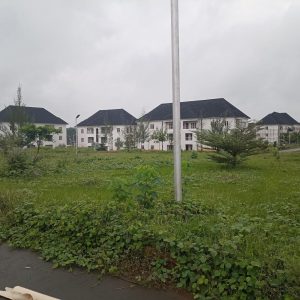
Uncompleted blocks at the British Canadian University, Obodu -Photo by Sylvia Felix
Evasive government officials
During a visit to Mrs. Bassey, permanent secretary, ministry of education before her retirement, she had insisted that our reporter should write to SUBEB as we indicated earlier in the story.
“You are the one who dropped that thing that practically threatened our lives. I was just wondering where all that was coming from because I don’t understand if due process was followed or something and it is done to the end, you are now telling me that the person is not qualified, that the person is qualified.
“Who determines the qualification? Is it CrossRiverWatch or is it you or the ministry? Not even the ministry, not even me because whatever was done, due process was followed. Everything was signed. Everything was done. We were lost as to where to begin to answer your questions. What information exactly do you want? Do you want it to indict somebody?”
“That contract did not come through the Ministry of Education. It was financed at SUBEB. How did you get to know it was so so person because you mentioned the company that was given? How did you get all that? Where did you get the information?” she asked.
You can also read – How Akwa Ibom farmers are challenging Northern Nigeria’s food production dominance
When the reporter visited the procurement office in the ministry of education, an official who insisted on being simply referred to as Austin Procurement, said he would not speak on the issue. He, however, asked the reporter to go back to get the consent of the permanent secretary before he can speak on the matter. On meeting the permanent secretary the second time, she promised to call Austen to oblige her with an interview. On the next visit to the procurement office, Austin still remained adamant and would not speak on the issue.
“Is it the FOIA request from Crossriverwatch? It won’t be from me because now, once you have a request like that you have to go back to the permanent secretary. Internal document has order. A permanent secretary cannot minute a document to me and direct you to come and meet me,” Austin said.
While expressing skepticism about the motive for the investigation, Austin said that due process was followed in the award of the controversial contract. At the SUBEB office, the Acting Chairman, Ettah Eyo said that the contract was not awarded by the agency.
“We’ve checked through our records and found that contract was not awarded by SUBEB. So you may make further inquiries from the ministry of education,” he stated.
Despite repeated visits to the Due Process and Price Intelligence Bureau, no conclusive information emerged. The secretary to the director of the bureau whose name was simply given as Mabah said, “The man is not around. The director is not around.” When the reporter asked to get her contact she responded angrily, “No aunty, come back tomorrow.”
Unanswered FOI requests
In our attempt to get the relevant information on the controversial contract, we sent Freedom of Information requests to the state ministry of education, the SUBEB and DPPIB. The requests specifically asked for the award of contracts to a company that lacked the professional qualification to do both jobs and why the contracts were awarded in violation of the state public procurement law of 2020, part 3 section 6(a) and why the contractor was overpaid even when the contracts were terminated.
The letters were sent to Ministry of Education on August 1, 2023; the DPPIB on August 1, 2023 and SUBEB on August 8, 2023. All the three organisations have not responded to the request at the time of filing this report on clear violation of the FOI Act.
Development experts call for probe
Richard Inoyo, the Country Director of Citizens Solution Network, and Ukeme-Obong Ekong, State Coordinator of We The People, called for a thorough investigation into the contract in separate interviews. Expressing their bewilderment, they questioned why a government would allocate funds for the establishment of a private enterprise. Speaking on the issue, Inoyo said, “This development is disheartening. If you examine the Cross-River State Government’s track record, you’ll observe an ongoing disregard for the state’s procurement laws. It’s even more disheartening that the current government is continuing this trend of violating its own laws.”
He raised concerns about competence, saying, “When companies lack the necessary expertise, entrusting them with the responsibility of supplying educational materials to the state through the ministry of education is fraught with the risk of subpar quality.”
In urging the government to take action, Inoyo underscored the need for the government to recognise that the prevailing culture of awarding contracts to institutions or companies lacking the necessary qualifications and competence reflected negatively on governance.
“This is unacceptable. It is high time citizens came together to draw the government’s attention to this unacceptable development. Enough is enough. We must communicate this message to the government without hesitation,” he said.
Ukeme-Obong Ekong, on her part, emphasized the significance of adhering to due process in public contracts. She stressed that: “Cross-River State has well-defined procurement laws and policies that dictate the selection of vendors and contractors for specific services. Following due processes in contracts is crucial. My concern lies in the fact that companies lacking the fundamental prerequisites—essential technical expertise and adequate human resources—should not undertake projects they are ill-equipped to handle.”
Ekong articulated the broader implications, stating, “When entities are aware that deviating from due process can lead to unnecessary complications, it becomes imperative for our state to embrace transparency and accountability. As citizens, we hold a collective responsibility to ensure our government remains accountable.”
She pointed out the potential consequences of disregarding due process, explaining, “When due process is sidestepped, the integrity of the entire contracting process is compromised. While policies are formulated by legislative bodies, executive officers must implement these policies. Effective governance necessitates alignment between policy creation and implementation.”
In her closing remarks, Ekong emphasized the importance of upholding democratic values, saying, “In a democratic society, adherence to protocols is vital. We must operate with integrity, order, and respect for established procedures. A true democracy thrives when all components of the government work together to uphold the principles of due process.”
This investigation is supported by the John D. and Catherine T. MacArthur Foundation and the International Centre for Investigative Reporting.

